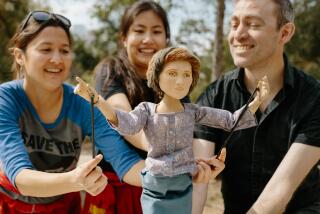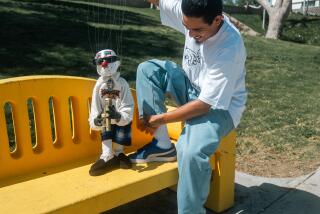Roland Sylwester; Puppeteer Told Bible Stories
- Share via
Roland Sylwester, a high school art teacher who developed a national reputation for his marionette and hand puppet shows illustrating Bible stories, has died. He was 73.
Sylwester, who made his own puppets in his garage, died Saturday at his home in Granada Hills.
Always intrigued by the small wooden characters, Sylwester created a marionette show called “And Then Came the Smog” in 1965 as an art teacher at Lutheran High School in Carson. A year later, he started considering religious applications when he was asked to produce a puppet play for a religious arts festival in Huntington Beach.
His first religious drama was “Elijah and the Prophets of Baal,” and plays illustrating the birth of Christ for the Christmas season and the crucifixion for Easter soon followed. After Sylwester’s retirement in 1990, he and his wife, Verna, devoted all their time to performing religious plays across the country with marionettes and smaller hand puppets.
“We consider this a ministry,” Sylwester told The Times in 1993. “These productions are aimed at all ages, but there is a message too. This is serious--not cutesy puppet stuff.”
Over 25 years, Sylwester gave more than 1,500 performances in schools and churches with his two troupes, Marionette Theatre of the Word and Puppet and the Word.
He made about 15 films about puppetry, was a writer and puppeteer for the television series “Sunrise Ways” that earned him an Emmy nomination, and directed popular workshops at Puppeteers of America conventions.
Sylwester also wrote two books, “Teaching Bible Stories More Effectively With Puppets” and “The Puppet and the Word.”
He sculpted and painted his puppets, costumed them, and manipulated as many as 30 of them at a time during performances. He also wrote the plays and prerecorded the dialogue, music and sound effects in order to devote his full attention to moving the marionettes or hand puppets. His wife was in charge of the lighting.
“The idea of puppets in today’s church may sound radical and new,” Sylwester told The Times in 1973, “but the association of puppetry and religion is as old as the recorded history of puppetry. The earliest records associate this art with man’s worship of a supreme being.”
He said his research showed use of movable figures by Egyptian women in ceremonies honoring the god Osiris as long ago as 460 BC and use of puppets to dramatize Hindu gods in India in 200 BC. Europeans used puppets in churches during the Middle Ages to present Bible stories to illiterate worshipers.
Sylwester is survived by his wife; five children, Don, Tom, Ann, Linda and Susan, and 12 grandchildren.
More to Read
The biggest entertainment stories
Get our big stories about Hollywood, film, television, music, arts, culture and more right in your inbox as soon as they publish.
You may occasionally receive promotional content from the Los Angeles Times.










